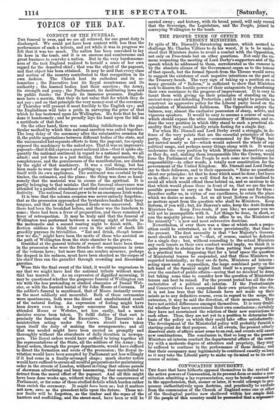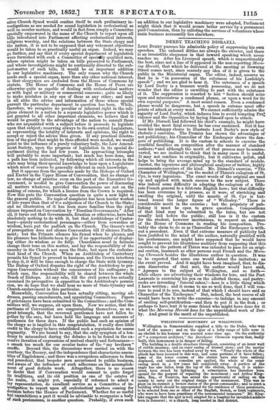CONVOCATION RES URGENT. THE fears that have hitherto opposed themselves
to the revival of the active powers of Convocation, in its present form or under a con- stitution admitting a lay representation, may be briefly summed up in the apprehension, that, sooner or later, it would attempt to pro- nounce authoritatively upon doctrine, and practically to exclude from the communion of the Church of England some one or other of the theological parties now sheltered within her ample fold. If the people of this country could be persuaded that a represent- alive Church Synod would confine itself to such preliminary in- vestigations as are needed for sound legislation in ecclesiastical as well as secular matters, and would in fact form simply a Committee specially empowered in the name of the Church to report upon all bills introduced into Parliament affecting ecclesiastical interests, religions worship, and the relations between the State clergy and
the nation' it is not to be supposed that any vehement objections would be taken to so practically useful an organ. Indeed, we may
go further, and say that if every special department of legislation were furnished with such a Committee of specitikly qualified men, whose opinion might be taken on bills presented to Parliament, and whose investigations might be continually directed to the sub- ject-matter of such bills, it would be an important addition to our legislative machinery. The only reason why the Church needs such a special organ, more than any other national interest, is that clergymen are excluded from the House of Commons by statute. The House of Commons and the House of Peers are otherwise quite as capable of dealinf with ecclesiastical matters as with legal or military or commercial concerns ; quite as likely to make mistakes in any one of these as any other; and need in all alike the advice and information of those whose cial pursuit the particular department in question has been. " therefore, we recognize no peculiar or inherent right in the reli- gious element in a nation to a separate legislative power which is not granted to all other important elements, we believe that it would be greatly to the advantage of the nation to consult those who are acquainted with a subject before it proceeds to legislate upon that subject; reserving always to its own central Legislature, as representing the totality of interests and opinions, the right to accept or reject the advice thus given. If any practical illustra- tion of the good that might be thus effected were needed, we would point to the influence of a purely voluntary body, the Law Amend- ment Society, upon the progress of legislation in its special de- partment during the last few years. Its approaching triumphs will probably be more important; but much has been done, and a path has been indicated, by following which all interests in the state may bring their special knowledge to bear upon a Legislature which must of course be generally deficient in such knowledge. But it appears from the speeches made by the Bishops of Oxford and Exeter in the 'Upper House of Convocation, that no change of law, no change of practice even on the part of the Executive Go- vernment, is needed to give Convocation the power of discussing all matters whatever, provided the discussions are not on the making of canons, for which a licence from the Crown is required. Now this puts the Convocation question in quite a new light to the general public. No topic of complaint has been harder worked of late years than that of the subjection of the Church to the State; and no illustration of it has been more familiar than the rigid silence imposed on Convocation by " Erastian Governments." After all, it turns out that Governments, Erastian or otherwise, have had absolutely nothing to do with it, but that Archbishops of Canter- bury—purely ecclesiastical personages—either from cowardice or wisdom, have put the padlock on the Church. The Queen's writ of prorogation does not silence Convocation till it silences Parlia- ment; but the Primate silences his Synod when he pleases, and his pleasure has hitherto been to give it no opportunity of display- ing either its wisdom or its folly. Churchmen must in fairness change their tone on this matter, and lay the responsibility of the anarchy in the Church not upon the State, but upon the ecclesias- tical head of the Church. When an Archbishop of Canterbury permits his Synod to proceed to business, and the Crown interferes to stop it, it will be time enough to charge the State with tyranny. The Bishop of Oxford disputes the right of the Archbishop to pro- rogue Convocation without the concurrence of his suffragans; in which ease, the responsibility will be shared between the whole Bench of Bishops. At any rate, till the civil power has actually exercised its prerogative in opposition to the Archbishop's permis- sion, we do hope that we shall hear no more of State-tyranny and Church-enslavement in this particular.
Meanwhile, Convocation has been actually sitting, moving ad- dresses, passing amendments, and appointing Committees. Papers of grievances have been submitted to the Committees ; and the Com- mittees will, we suppose, sit upon them. Now we notice, that the partisans of Convocation are congratulating themselves, as on a great triumph, that the reverend gentlemen have not fallen to- gether by the ears but have held the language and manners of gentlemen for three days. If the public had such an opinion of the clergy as is implied in this congratulation, it really does little credit to the clergy to have established such a reputation for coarse pugnacity. We are bound to say, that the only symptom of a ten- dency to misconduct during the debates is to be found in the ex- cessive iteration of expressions of.mutual charity, and forbearance— a smack too much for our secular tastes of the "my brethren" snuffle. Beyond this, the discussions were carried on with the courtesy, the fluency, and the independence that characterize assem- blies of Englishmen ; and there was a scrupulous adherence to form and precedent, that bespoke men accustomed to public business, and aware of the influence of such adherence on the accomplish- ment of good definite work. Altogether, there is no reason to doubt that if Convocation would consent to quite forget its traditions, and its old position as one of the estates of the realm, it might yet, especially: if reformed to admit a lay representation, do excellent service as a Committee of in- vestigation to report upon all ecclesiastical matters coming for decision before the Houses of Parliament Whether for so useful but unambitious a part it would be advisable to reorganize a body of such pretensions, is another question. Probably, if even such
an addition to our legislative machinery were adopted, Parliament might think that it would secure better service by a permanent paid Commission, than by enlisting the services of volunteers whose main business necessarily lies elsewhere.



























 Previous page
Previous page